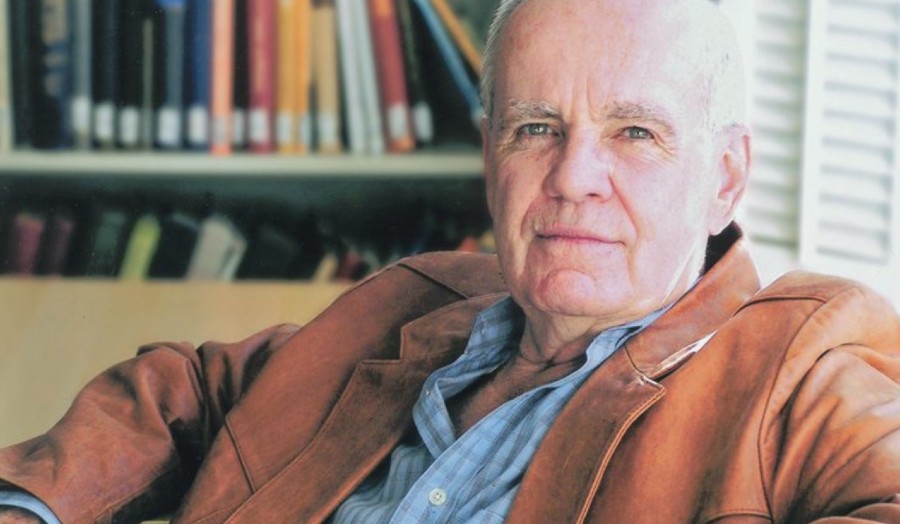A profound loss reverberates through the literary landscape as Cormac McCarthy, takes his leave, leaving behind an enduring echo of his unyielding realism.
Santa Fe, New Mexico – Cormac McCarthy, the celebrated author known for his unflinching portrayals of America’s stark frontiers and dark underbelly, passed away on Tuesday at the age of 89, according to his publisher.
The Pulitzer Prize-winning novelist, renowned for works such as “The Road” and “No Country for Old Men,” died at his residence in Santa Fe, leaving behind a profound literary legacy.

Over the course of his illustrious six-decade career, McCarthy garnered critical acclaim and numerous literary accolades for his twelve sparse and soul-stirring novels. His writing, though demanding, struck a chord with readers worldwide, as he fearlessly delved into the depths of human torment and the haunting landscapes of rural America. McCarthy’s raw and clinical descriptions garnered him a fiercely loyal following.
Born Charles McCarthy on July 20, 1933, in Providence, Rhode Island, the author relocated with his family to Tennessee at the age of four. His father, a lawyer, sought a fresh start in the southern state. McCarthy later changed his given name to Cormac, inspired by an Irish king, as he decided to forgo university education and pursue a full-time career in writing.
While working at a car parts shop in Chicago during the 1960s, McCarthy penned his debut novel, “The Orchard Keeper,” which was subsequently published by Random House. His editor at the time, Albert Erskine, had previously collaborated with the esteemed writer William Faulkner, to whom McCarthy is occasionally compared. This gritty and violent tale serves as an homage to the untamed natural environment of the Tennessee mountains, where McCarthy spent his formative years.
Throughout his career, McCarthy remained focused on the dark contours of humanity, garnering an ardent fan base and critical success. Following “The Orchard Keeper,” he received numerous writing fellowships, including one from the Rockefeller Foundation. In 1968, he released “Outer Dark,” a story exploring the consequences of an incestuous relationship. The ensuing novel, “Child of God,” published in 1973, depicted a man who retreats to the Appalachian mountains to isolate himself from society, delving into themes of murder and necrophilia.
In contrast, McCarthy’s 1979 novel, “Suttree,” often regarded as his most humorous work, offers a portrayal of a marginalized community residing along the Tennessee River. McCarthy labored on the book intermittently for two decades, showcasing his dedication to his craft.
In 1981, McCarthy’s talent was recognized with a prestigious MacArthur Foundation grant, commonly referred to as a “genius grant.” He subsequently settled in El Paso, Texas, near the Mexican border, an experience that profoundly impacted his later works. The publication of “Blood Meridian” in 1985 marked a turning point in his career. This post-apocalyptic Western, set in Texas and Mexico during the 1840s, captivated readers with its powerful narrative.
The 1990s witnessed the release of The Border Trilogy, comprising “All the Pretty Horses,” “The Crossing,” and “Cities of the Plain,” all set in the American West. Despite initial doubts expressed by his editor Erskine, “All the Pretty Horses” defied expectations, becoming an unexpected hit and securing a spot on the New York Times bestseller list. The novel’s cinematic adaptation, starring Matt Damon and Penelope Cruz, drew Hollywood’s attention in 2000.
McCarthy’s popularity surged even further in 2007 when his novel “No Country for Old Men” was adapted into a film by Joel and Ethan Coen, earning four Oscars, including a Best Supporting Actor award for Javier Bardem. Prior to this, in 2007, McCarthy was honored with a Pulitzer Prize for his haunting masterpiece, “The Road,” a gripping tale of a father and son navigating a post-apocalyptic landscape. The novel’s inclusion in Oprah Winfrey’s book club catapulted McCarthy to even greater prominence and led to its adaptation into a film starring Viggo Mortensen.
In a remarkable culmination to his literary career, McCarthy’s final works were a pair of interconnected novels: “The Passenger” and its prequel “Stella Maris.” Released in 2022, these novels delved into profound themes of grief and the nature of knowledge, showcasing McCarthy’s unwavering ability to grapple with complex subjects.
Known for his reclusive nature and modest lifestyle, McCarthy led a life with few material indulgences. For many years, he resided in motels, prioritizing his work and artistic vision over material comforts. Throughout his personal life, McCarthy was married three times and had two sons.
With the passing of Cormac McCarthy, the literary world mourns the loss of an unparalleled voice who fearlessly explored the depths of human existence. His indelible contributions to American literature will continue to captivate readers for generations to come. McCarthy’s legacy as an unflinching chronicler of the American frontier and the darker recesses of the human psyche will endure, ensuring his place among the literary greats.



